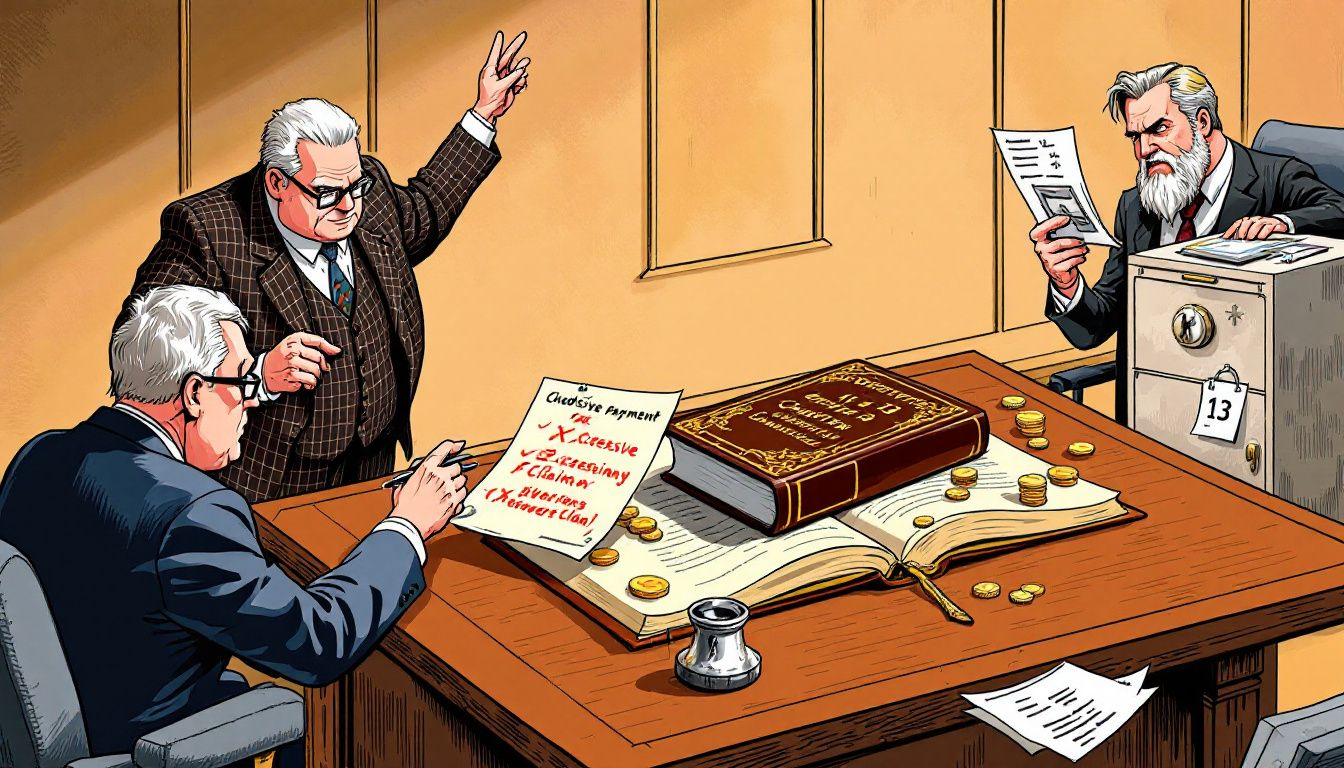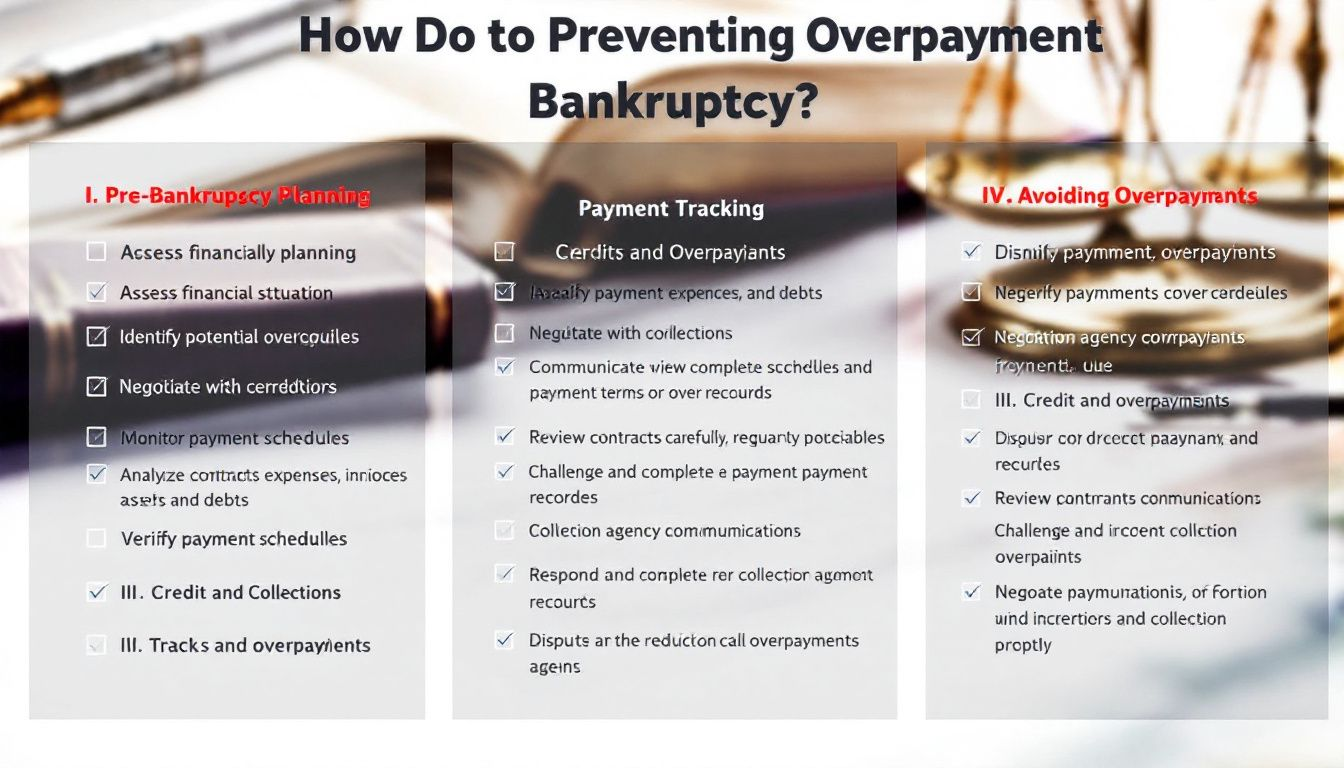If you’ve overpaid on your Chapter 13 bankruptcy plan, you may be unsure what to do next. Chapter 13 overpayment happens when you pay more than required into your repayment plan. But to get a refund usually means you paid more than 100% into the plan. We explain the causes of overpayments, how to handle them, and what steps to take to rectify the situation. You should avoid incurring additional debt during Chapter 13 bankruptcy proceedings. Overpayment means dischargeable unsecured debts we overpaid either because plan payments were too high or you paid longer than the minimum commitment period.
Key Takeaways
- An overpayment in a Chapter 13 bankruptcy case occurs when a debtor pays more than necessary into their repayment plan, often due to miscalculations or changes in income.
- To handle overpayments, debtors should inform their Trustee, gather documentation, consult their attorney, and request appropriate adjustments to their repayment plan.
- Overpayments can impact secured debts and unsecured creditors, potentially requiring modifications to the repayment plan and leading to refunds to a debtor after accounting for surplus payments.
- The minimum commitment period in a Chapter 13 bankruptcy case is the minimum required duration of debt repayment. It varies based on the debtor’s income level at the time of filing:
- the minimum commitment period is three years for those below the state median income, and
- the minimum commitment period is five years for those above.
- these periods can be shortened if you get an early hardship discharge
- Both secured and unsecured creditors are dischargeable debts.
- The debtor has an obligation to pay their best efforts, and an inheritance, lottery winnings, or personal injury lawsuit may cause this.
What is an Overpayment in Chapter 13 Bankruptcy?

In a Chapter 13 bankruptcy filing, overpayment occurs when a debtor pays more into the repayment plan than necessary to satisfy the repayment plan. This can happen for several reasons, often involving the debtor making extra payments beyond what the bankruptcy plan specifies or excess debt claims. Debtors often under or over estimate a car or mortgage arrears.
The plan may pay from 0% to 100%. Before the schedule of allowed claims is filed, the debtor should review every claim and the money the claim states you owe. If your disposable income and the unsecured claims allow you to pay less, determine a lower amount to repay. But it still allows you to pay off priority debt and secure debts up to date.
The Chapter 13 bankruptcy case is a court-supervised repayment plan where the debtor makes regular payments to a Trustee. The Trustee then distributes funds to creditors. When overpayments occur, it complicates the otherwise straightforward process, leading to adjustments in future payments, possible refunds, or increased scrutiny by creditors and the Trustee. Successful completion of the repayment plan leads to discharge releases, freeing the debtor from personal liability for certain debts.
Causes of Overpayments During Chapter 13 Repayment Plan
Miscalculations and changes in financial circumstances often lead to overpayments in Chapter 13 bankruptcy. A common cause is errors in calculating disposable income, resulting in excess payments. When your income fluctuates, it’s easy to either overestimate or underestimate your payment amounts, resulting in discrepancies. Failure to pay an ex-spouse alimony or child support can result in the dismissal of the bankruptcy case or conversion to Chapter 7, emphasizing the legal obligation to fulfill these payments.
Changes in a debtor’s income after filing can also cause overpayments if the repayment plan isn’t adjusted. This is particularly common for individuals with variable incomes, such as the self-employed or those relying on irregular income sources.
Documentation errors, whether clerical or due to unforeseen expenses, can complicate payment calculations and lead to overpayments. Promptly addressing these issues helps maintain accurate and manageable payments throughout your Chapter 13 bankruptcy case. Your plan should pay secured debt up to date. But your budget and disposable income should barely pay the secured debts and federal taxes while being feasible.
Handling Overpayments: Steps to Take
The Trustee will not refund payments, but he may suspend plan payments to adjust the overpayment based on circumstances. Lastly, request adjustments to your repayment plan if an overpayment occurs, which might involve lowering future payments or seeking a refund. If the plan has funds that are being paid over to the court, you may be able to apply for them to be paid to you after completing the plan. There are limited exceptions, such as fraud, both pre-confirmation and post-confirmation. There is no interest paid on the amount you claim the court owes to you.
Impact on Secured Debts and Unsecured Creditors
Overpayments in a Chapter 13 bankruptcy case can have significant effects on both secured debts and unsecured creditors. For secured debts, such as mortgages or car loans, the Trustee may need to amend the repayment plan to address the overpayment situation. Debtors are required to pay at least arrearages on the secured property in the repayment plan to retain it. Overpayments may catch up with any default on a secured loan early.
Unsecured creditors, on the other hand, might see a different impact. Creditors with unsecured claims, like credit card debts or medical bills, may receive less than the total owed during the Chapter 13 repayment process. This means that an overpayment could inadvertently benefit these creditors more than initially anticipated, potentially altering the balance of payments between secured and unsecured debt.
Understanding these dynamics helps debtors navigate Chapter 13 bankruptcy effectively, ensuring that adjustments for overpayments are fair and compliant with bankruptcy code requirements.
Refunds and Adjustments for Overpayments
In cases of overpayment, the Trustee is responsible for refunding any excess amount after a case is discharged. This involves preparing an accounting of payments and determining the surplus, with proper documentation ensuring transparency and accuracy. Refunds are not automatic and require court approval. This often requires your bankruptcy attorney to file a motion and order. The Trustee manages these adjustments, ensuring compliance with Chapter 13 legal requirements, proper documentation, and court communication if needed.
Debtors must stay informed and proactive in monitoring payments and communicating with the Trustee. This vigilance ensures prompt addressing and rectification of overpayments, keeping the repayment plan on track without financial strain.
The Trustee manages Chapter 13 overpayments and determines the appropriate course of action. If a debtor overpays, the Trustee may apply excess funds to future payments and suspend plan payments. This process often requires court approval to ensure legal soundness and fairness.
Converting to Chapter 7 Due to Overpayment Issues
When payments become unmanageable, debtors may consider converting their Chapter 13 bankruptcy filing to Chapter 7 while filing bankruptcy. This can provide relief from unmanageable payment plans and potentially discharge various difficult-to-manage dischargeable debts.
Converting to Chapter 7 involves meeting income eligibility criteria and may require a means test. A Chapter 7 can lead to the liquidation of nonexempt assets to pay creditors, providing a fresh start. However, this decision requires thorough consultation with a bankruptcy attorney to fully understand its implications.
For many, converting to Chapter 7 is a last resort after struggling with the repayment plan and overpayments. It offers a way out of a financially untenable situation, but it also comes with its own set of challenges and considerations.
Preventing Overpayments: Tips for Debtors and hardship discharges
Preventing overpayments in Chapter 13 bankruptcy requires proactive financial management. Keeping a detailed and realistic budget helps debtors monitor expenses and ensure payments align with their repayment plan. If the payments are too high, modify the plan to lower payments or lower the percentage paid to unsecured debts.
You can also request an early hardship discharge. To qualify for an early hardship discharge generally requires:
- that you made the majority of payments,
- the plan repaid what a Chapter 7 would have, and
- your circumstances establish your bankruptcy, and regular income qualifies for a hardship due to no fault of your own.
Frequently Asked Questions
Do you get money back after Chapter 13?
Yes, after a Chapter 13 case is dismissed, overpaid funds received will be directly disbursed to the debtor once the Trustee has closed the case.
What is an overpayment in Chapter 13 bankruptcy?
An overpayment in Chapter 13 bankruptcy refers to a situation where a debtor contributes more funds to their repayment plan than is necessary.
How do overpayments affect secured debts and unsecured creditors?
Overpayments advantage unsecured creditors by overpaying the repayment plan. Secured debts may necessitate modifications, but there is little benefit to overpaying unsecured debt.
How can I prevent overpayments during Chapter 13 bankruptcy?
To prevent overpayments during Chapter 13 bankruptcy, maintain a detailed budget and review your repayment plan with a bankruptcy attorney.


